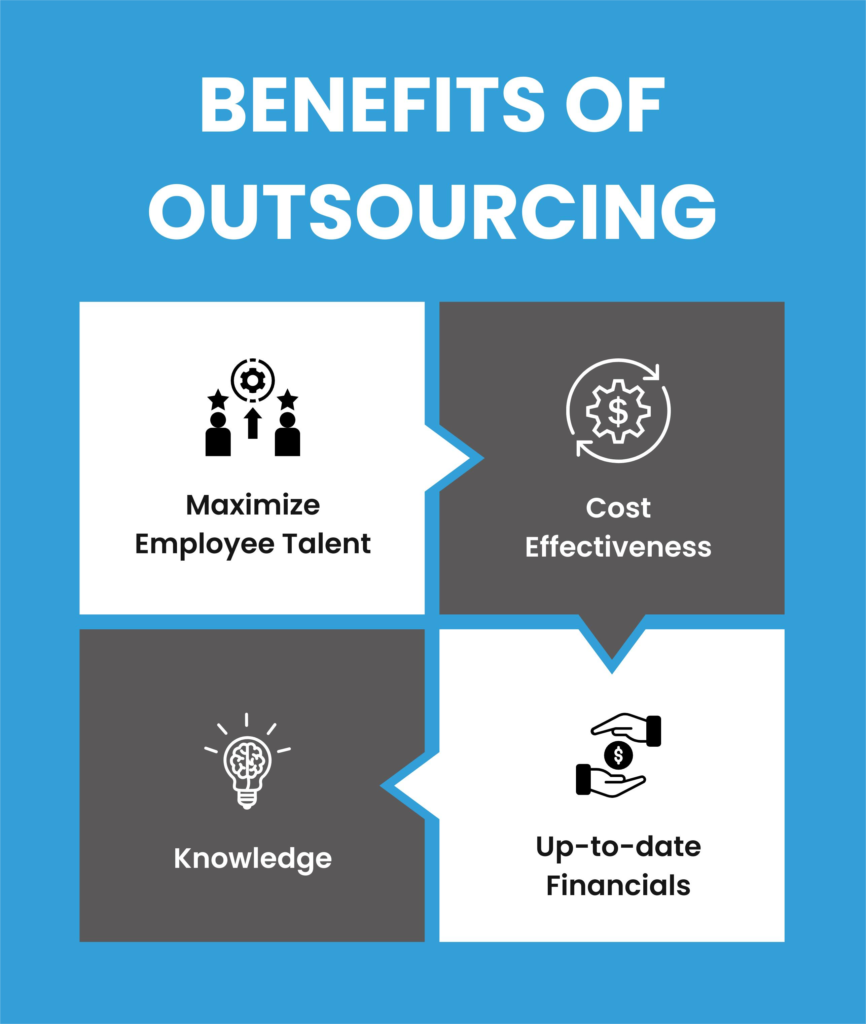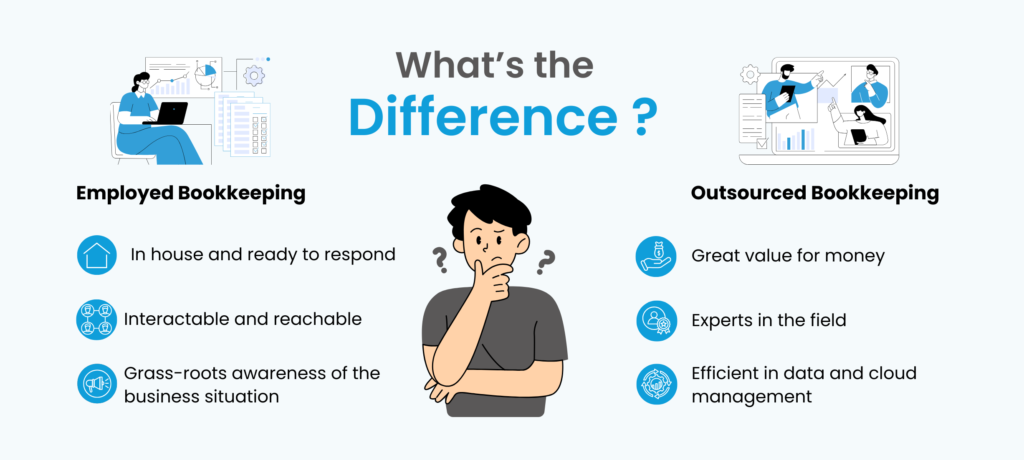
Outsourced bookkeeping services involve managing financial records for a business outside its physical office premises. Instead of assigning an in-house employee or team to handle tasks such as recording transactions, reconciling accounts, managing accounts payable, and preparing financial statements, businesses hire external service providers to perform these functions. This arrangement is both convenient and cost-effective, as these services can be accessed remotely.
With outsourced bookkeeping, a third-party provider takes responsibility for organizing and maintaining the financial records of the business—an essential aspect of effective bookkeeping. This approach allows business owners to focus on core operations and business growth while leaving financial management in the hands of experienced professionals.
Outsourced bookkeepers ensure every financial transaction, including sales, expenses, and payments, is accurately recorded. This creates a reliable and organized financial record, helping businesses make informed decisions.
Outsourced bookkeeping services regularly reconcile accounts by comparing bank statements with company records. This process identifies and resolves discrepancies, ensuring financial accuracy and avoiding potential errors.
Payroll needs to be accurate and timely to ensure employees are paid without delays. Outsourced bookkeepers handle payroll processing, including calculations, deductions, and tax filings. Their expertise minimizes compliance risks and saves time.
Professional bookkeepers prepare critical financial statements, such as income statements, balance sheets, and cash flow statements. Even small businesses benefit from these detailed reports, which offer insights into financial performance and support effective strategic planning.
Outsourced bookkeeping services assist with tax preparation by maintaining accurate records and ensuring taxes are filed on time. They stay up to date with tax regulations, helping businesses remain compliant and avoid penalties.
Timely invoicing and proper management of accounts payable are vital for healthy cash flow. Outsourced bookkeepers handle vendor invoices, payments, and reminders, ensuring bills are paid on time and nothing is overlooked.
Managing accounts receivable involves tracking outstanding payments, sending reminders, and ensuring timely collection. Outsourced bookkeeping services streamline this process to maintain consistent cash flow and avoid delays.

Select a bookkeeping service with a solid track record in your industry. Experienced professionals are familiar with industry-specific regulations and can provide valuable insights tailored to your business needs.
Top-notch bookkeeping providers use advanced software to deliver efficient and secure services. Ask about the tools they utilize to manage financial tasks and ensure their systems are compatible with your existing technology.
Protecting financial data is critical when outsourcing bookkeeping. Verify that the service provider follows strict security protocols and uses secure platforms to safeguard your sensitive information.
Different bookkeepers specialize in various areas, such as payroll, tax preparation, or accounts reconciliation. Choose a provider that offers a comprehensive range of services to meet your current needs and adapt as your business grows.
Effective communication is essential for successful outsourcing. Opt for a bookkeeper who provides regular updates, responds promptly, and maintains clear and consistent communication, whether they operate locally or internationally.
Compare pricing models to find a service that fits your budget. Ensure the provider has a transparent fee structure with no hidden charges that could disrupt your financial planning.
Medical practices and healthcare facilities often deal with large transaction volumes and complex billing systems. Outsourced bookkeeping simplifies financial management by maintaining accurate records for insurance claims and ensuring compliance with regulations.
Real estate businesses handle property transactions, leases, and commission payments. Outsourcing helps track expenses, manage cash flow, and prepare organized financial statements, allowing real estate agents to focus on serving their clients.
Law firms must manage client trust accounts and comply with strict regulations. Outsourced bookkeeping services assist legal professionals in maintaining accurate records, tracking billable hours, and adhering to regulatory standards.
The hospitality industry faces high operational expenses and fluctuating revenue streams. Outsourced bookkeeping ensures accurate cash flow monitoring, inventory management, and payroll updates, enabling hotel and restaurant owners to make well-informed business decisions.
Creative agencies often work on a project basis and manage varying income streams. Outsourced bookkeeping services handle billing cycles, monitor project expenses, and manage payroll for freelancers, keeping financial operations streamlined and organized.
Tech companies, particularly startups, benefit from outsourcing bookkeeping to manage investment funds, track operational expenses, and ensure accurate financial reporting. This support allows them to focus on scaling and innovation.

Automation is set to play a vital role in outsourced bookkeeping, with more firms utilizing AI-powered tools for tasks like data entry, reconciliation, and financial reporting. This shift minimizes errors, accelerates processes, and enhances overall accuracy and efficiency.
With the rise in cyber threats, outsourced bookkeeping providers will prioritize stronger data security measures. Advanced encryption, secure cloud storage, and multi-factor authentication will become standard to safeguard sensitive financial information.
Outsourced bookkeeping is expected to focus on more customized solutions, catering to specific industries and varying business sizes. This personalization ensures businesses receive insights and services aligned with their unique financial objectives.
The demand for continuous access to financial updates will drive the growth of offshore and nearshore bookkeeping services. These providers will offer 24/7 support, ensuring businesses can address their financial needs anytime.
Future outsourcing trends will emphasize seamless integration with tools like CRM, payroll, and ERP systems. This integration will streamline workflows and promote a more unified and efficient approach to managing business operations.
Outsourced bookkeeping is more than just crunching numbers—it’s about giving you the freedom to focus on what you love most about your business. By trusting professionals to handle your financial tasks, you can reduce stress, make smarter decisions, and have peace of mind knowing your books are in good hands. Let us help you simplify your bookkeeping and set your business up for success. Reach out to us at BookkeeperLive we’d love to be a part of your journey!
1. What kind of businesses can benefit from outsourced bookkeeping?
Businesses of all sizes and industries can benefit, from small startups to large enterprises.
2. What is the cost of outsourced bookkeeping?
Costs vary depending on the provider, the scope of services, and your business's specific needs.
3. Can outsourced bookkeepers help with tax preparation?
Yes! While some providers only assist with records for your tax accountant, BookkeeperLive offers both bookkeeping and tax preparation services. Contact us today to make managing your finances effortless!
BookkeeperLive provides affordable bookkeeping and accounting services tailored to your business goals.





No calls, No meetings, No spam. Get started with a free trial by filling out the form.
*NDA included for your data protection.
Copyright © 2025 BookkeeperLive. All rights reserved. Privacy Policy Terms of Use
Please visit our India site to see services designed for your country
Enter the code, fill out the form, and unlock financial clarity with a free trial.